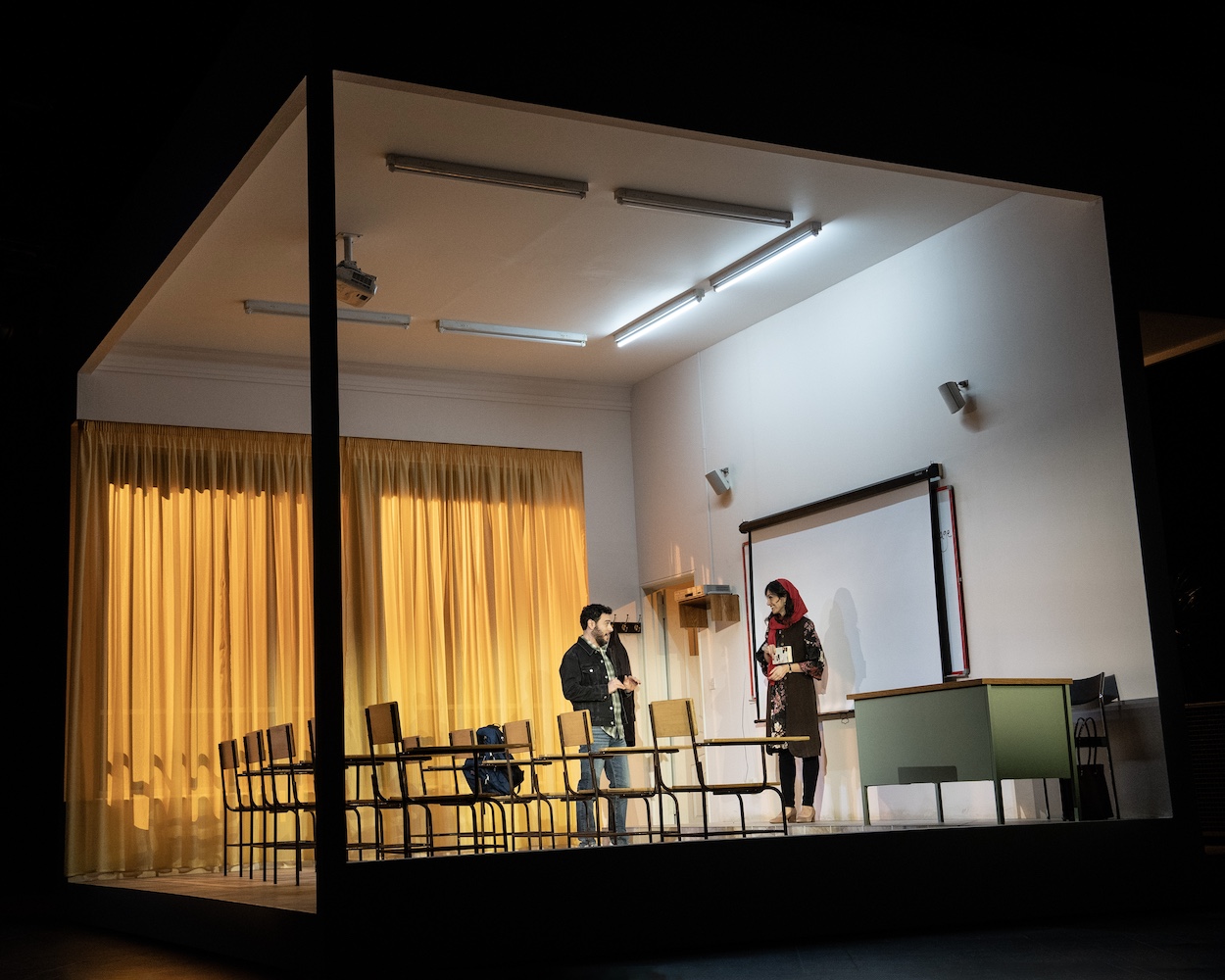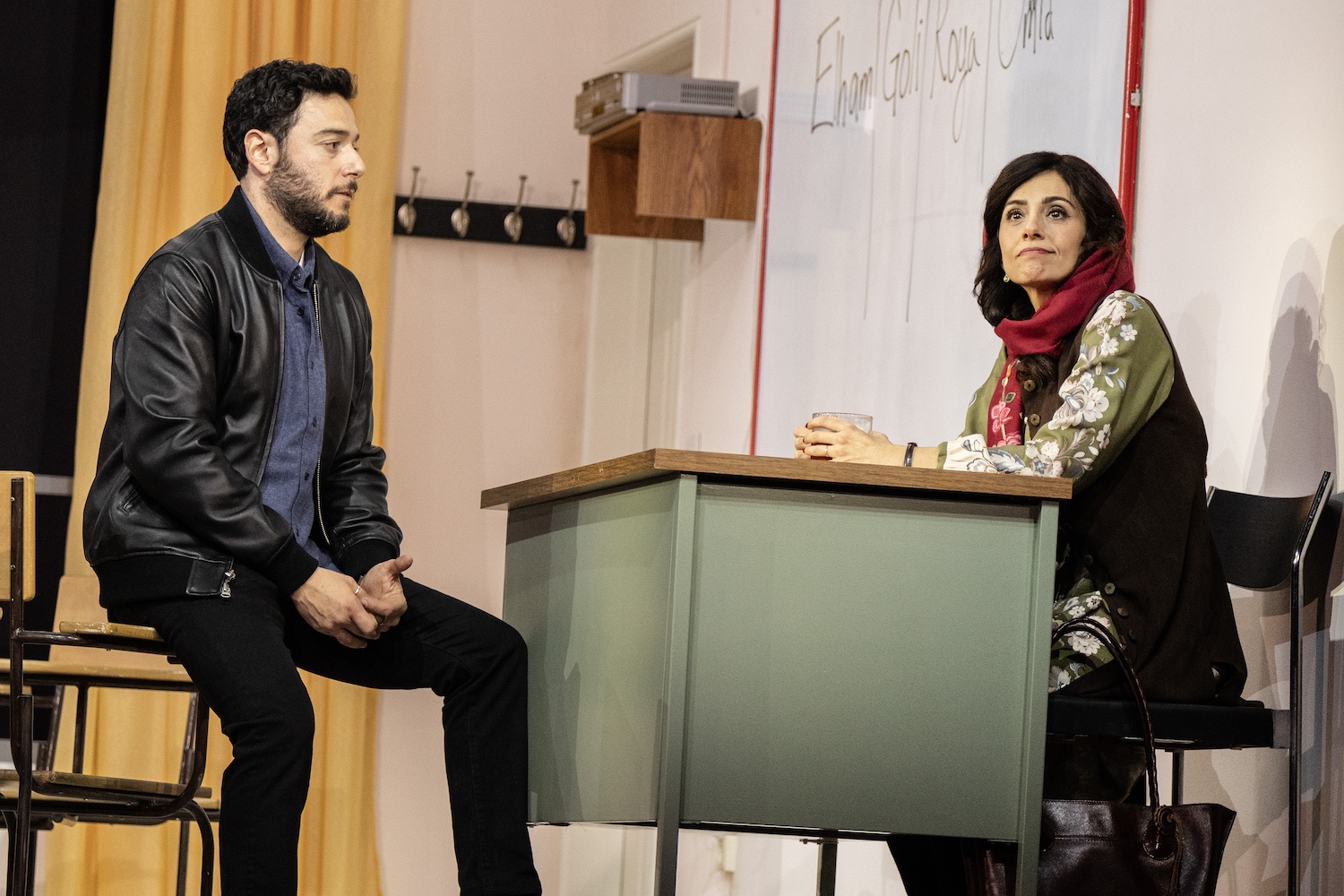****/***** (four out of five stars
“English only!” That’s the rule in the classroom, Marjan declares, where she is teaching the language to five eager Iranian students in the city of Karaj, Iran, in 2008.
But English (now playing on Broadway at the Roundabout’s Todd Haimes Theatre)—Sanaz Toossi’s revelatory, multi-layered journey through a six-week course—teaches much more than the mastering of a new tongue. It’s a profound, universal lesson about what language actually means in terms of human identity.
Performed in 90 swift minutes, we watch five students struggle to learn the English language in preparation for the TOEFL (Test of English as a Foreign Language), for which a passing score is needed in order to acquire a green card or visa. In twenty-two brief scenes Marjan (Marjan Neshat), their eager instructor, leads them through a number of exercises –including “show and tell,” role playing and ball tossing. The challenge of pronouncing the letter “w” (instead of “v”) yields the most humorous results, as they struggle to articulate “wishy-washy,” “when we were weeping,” “Wicked Witch of the West,” and “Willy Wonka.” Students are encouraged to bring in English-language films (a favorite features Julia Roberts and her “white teeth”). They attempt to distinguish between American English (Indiana Jones), Australian English (Muriel’s Wedding) and English English (Love Actually). Their practice of idioms (e.g. “hold your horses”), and the misuse of the “f” word, provide additional entertainment.
Though Marjan, their dedicated teacher, says that the reason to learn languages is “to speak our needs, our wants, our souls,” we discover that the students have other personal as well as practical motivations. Elham (Tala Ashe), for example, is determined to become a medical student and study in Australia, but she has failed the TOEFL five times. “My accent is a war crime. English feels like my enemy,” she confesses ashamedly: “Every day I feel like idiot,” (“an idiot,” her teacher corrects her).

Roya (Pooya Mohseni) has a far different motivation. Her son Nader has moved to “the Canada” (not “the,” her teacher corrects), and his goal is total assimilation. He has changed his name to “Nate,” and named his daughter “Claire.” Furthermore, Nate doesn’t want Roya to visit and speak Farsi (the Iranian language) to Claire if she comes to visit. “Why you give my granddaughter name I cannot say?” Roya cries on the phone in her broken English.
Then there’s Goli (Ava Lalezarzadeh), the youngest student, aged eighteen. She’s studying English out of love of popular culture . . . and more: “No one really listens to me in Farsi, but when I speak English, I’m three, four feet taller!”
Most complex is the one male student, Omid (Hadi Tabbal). He speaks perfect English, and during the six-week course develops a close relationship with Marjan, the teacher. Then (spoiler alert) there’s a sudden revelation—he confesses toward the end of the play that he is a dual US/Iranian citizen, born in Ohio of naturalized American citizens, the youngest of four children. The family traveled back and forth between the US and Iran until he was thirteen, when they finally moved back to Iran. He sought out the class because “the only place I speak perfect English is here [in the classroom] . . . I live in that gap. All my life I’ve felt like I was half a thing.” To Elham, his fellow student, Omid says: “You’ve always been from here. You know who you are.”
And finally, there’s Marjan the teacher. She lived in Manchester for nine years, where she mastered the English language and was called “Mary.” “The smallest sacrifices can open our world,” she explains to her students, regarding her new name. But Roya challenges her: “Our mothers get to name us. Not foreigners.”

Swiftly and smoothly directed by Knud Adams, the clever set (designed by Marsha Ginsberg) revolves from the classroom setting to a balcony that looks upon the outside world—a metaphor for language itself, how it inhabits us on the inside, and where we belong in the outside world. “How strange it is to invite a foreign language into your body,” Marjan observes.
As for the language of the script itself, playwright Toosi cleverly has the actors use perfect English when they are speaking Farsi, and halting English when they are learning with their teacher. Adams deftly directs the flow of these alternating “languages.”
Much happens over this six-week course in English. Before she drops out of class, Roya insists on playing a Farsi song, against her teacher’s protests. “We should remember that we came from this,” she declares. Before she leaves, Roya shares her dream—that “instead of the Americans, the British, and everyone telling us what to speak and how to say it, all of us would speak Farsi.” Omid reveals that he has become engaged to an Iranian and that they will remain in Iran. “I finally feel peace,” he confesses. Elham returns triumphantly to tell Marjan that she got a 99 on her TOEFL test.

But what about the teacher? In the final moments of the play, one student asks Marjan why she returned to Iran. “I got tired,” she says, tentatively, then later adds: “When you speak another language—a language that’s not yours—you start to forget who you are. How long can you live in isolation from yourself?”
In ninety intense, entertaining, and enlightening minutes, playwright Toossi has given us a deep, richly layered play about what language really means to the idea of being human: namely identity, self-respect, pride, belonging, and, above all, home. As Marjan discovers: “One day, the voice that comes out of your mouth is the one that you love.”
English. Through March 2 at the Todd Haimes Theatre (227 West 42nd Street, between Seventh and Eighth Avenues). www.roundabouttheatre.org
Photos: Joan Marcus












